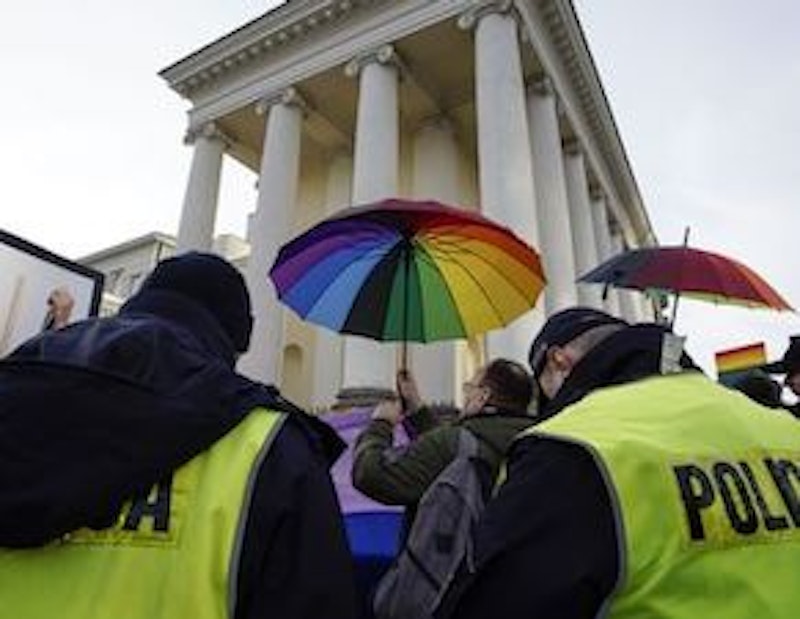Tens of thousands of Poles marched in Warsaw on Monday for the country’s annual Independence Day rally, an event organized by far-right nationalist Polish organizations. This year’s rally focused specifically on rejecting Western European liberalism and returning to traditional Catholic values. “We have to return to our roots,” Independence March Association head Robert Bakiewicz preached to the crowd. “Our world has abandoned God and Christianity, We will die as the nations of Western Europe are dying.” And by “abandoned God and Christianity,” he meant “accepted LGBTQ people as human.”
Poland’s far-right Law and Justice Party (PiS) has been waging a war on LGBTQ rights since gaining power in 2005, but this year has seen an increasing anti-LGBTQ campaign as a way to win Poland’s October election. According to Reuters, 90 percent of Poles are conservative Catholics, and more than half of the population say homosexuality is “not normal but can be tolerated.” Throughout the year, the PiS has worked hard to make it so that more people will find homosexuality intolerable. It’s working so far because while the PiS lost the senate in last month’s elections, it won the parliament, which has more political influence.
The anti-LGBTQ campaign began in March when the PiS publicly condemned a pro-LGBTQ sex-education program, declaring it to be Western liberalism’s latest attack on traditional Catholic values. “The whole social mechanism of preparing a young person, first a child and then a youth, for future roles as women and men, to start a family, for the role of mother and father, is being questioned,” said party leader Jaroslaw Kaczynski. “It could be destroyed.”
Although it was all political rhetoric at first, many saw the murder of pro-LGBTQ Gdansk mayor Pawel Adamowicz in January as a sign of things to come. Their worst fears came true at the July 20th Pride March in Bialystok. At first it was a victory for the town’s LGBTQ community; not only was it Bialystok’s first Pride March, but it was seen as a step for Mayor Tadeusz Truskolaski to change the conservative town’s anti-LGBTQ reputation. All hopes were dashed when a mob of far-right nationalists and religious extremists attacked the Pride marchers with projectile objects—including bottles filled with urine—and physical assault. “They were hunting us down,” a gender-nonconforming 19-year-old named Precel later told CNN. “I was born here [in Bialystok], and now I am studying here, but now I don’t know how it will be in the future.”
The PiS’ attacks on LGBTQ rights has strengthened Poland’s LGBTQ rights movement. The movement had a rough start in the 1990s due to poor organization, but greatly improved during the ‘00s, and activists were better able to lead successful campaigns like getting two LGBTQ people elected into parliament in 2011. “When the taken-for-granted routines and accommodations that gays and lesbians had constructed to negotiate their daily lives suddenly came under threat,” says Conor O’Dwyer of the Washington Post, “individuals became more willing to risk costly collective action.”
While not as extreme, the PiS’ war on LGBTQ rights is similar to the Trump administration’s repeated attacks on LGBTQ people. The most recent example is the Department of Health and Human Services’ proposed rule to allow HHS grant recipients to refuse service to LGBTQ people based on religious beliefs. If passed, this new rule would give federally funded programs the right to not recognize same-sex marriages, allow adoption agencies to turn away same-sex couples, and make it harder for trans people to seek medical care.
Outside of Washington, support for LGBTQ rights has slightly declined among 18-34-year-olds. Alt-Right leaders are telling their followers to kill trans people, and the American Medical Association has declared the rising number of murdered trans women—particularly those of color—an “epidemic.” There are significant differences between the US and Poland; so far no far-right extremist group has interrupted a Pride March. However, the PiS’ rise to power and the growing threats against Poland’s LGBTQ population should serve as a warning that it can happen here.

